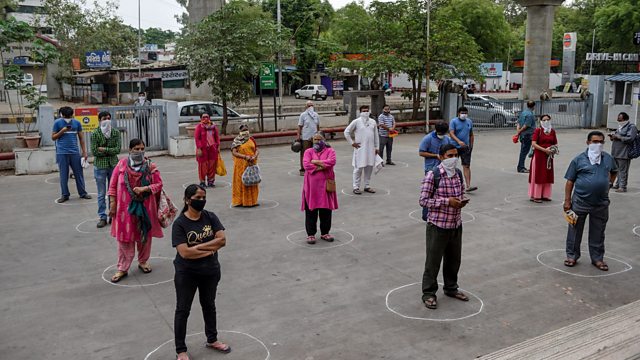Are national lockdowns evidence of policy failure?
Evidence for lockdowns, why a more targeted approach is recommended; herd or population immunity; how common is SARS-Cov-2 reinfection; does exposure to Covid-19 provide immunity
As a surge of cases risks overwhelming health services in parts of Europe, Claudia Hammond and experts from around the world examine the evidence behind using lockdowns to supress the virus.
Lockdowns describe a huge range of actions that many governments took in the first wave of the pandemic when so little was known about where the virus was circulating. But full lockdowns are seen as very blunt tools, a last resort because they can have enormous social and economic consequences.
Instead a more targeted, localised, smarter response to slow down transmission is recommended, where data about virus circulation informs focussed interventions.
Also in the programme, The Great Barrington Declaration earlier this month called for an end to current lockdown policies and appealed for the vulnerable to receive “focussed protection” while everybody else “should immediately be allowed to resume life as normal”. The goal, the group of scientists said, should be to minimise deaths and social harm, until herd immunity, or population immunity, is reached.
The World Health Organisation has described such a strategy as dangerous and counterproductive. Claudia’s guests discuss the scientific and ethical issues raised and consider the scale of global exposure to this novel virus. So far only around 10% of the world’s population have been infected so what would a policy of herd immunity in the absence of a vaccine mean for the remaining 90%?
Listeners put their questions about coronavirus and the pandemic directly to Claudia and her panel of specialists, which this month includes Dr Maria Van Kerkhove, Technical Lead for the World Health Organisation’s Covid-19 Response; Professor Salim Abdool Karim, a clinical infectious diseases epidemiologist and Chair of South Africa’s Ministerial Advisory Committee for Covid-19; Martin McKee, Professor of European Public Health at the London School of Hygiene and Tropical Medicine and one of the signatories to the John Snow Memorandum; epidemiologist Tove Fall, Professor at Uppsala University in Sweden running the Covid-19 symptom app and virologist Professor Steven Van Gucht, from Sciensano, the Belgian national institute for public and animal health.
The Evidence is produced in association with Wellcome Collection.
Production team: Fiona Hill and Maria Simons
Studio engineer: Jackie Margerum
Editor: Deborah Cohen
Photo: Customers standing on markers, Credit: Sam Panthaky/AFP/Getty Images
Last on
Broadcasts
- Sat 31 Oct 2020 19:06GMT���˿��� World Service
- Sun 1 Nov 2020 12:06GMT���˿��� World Service

